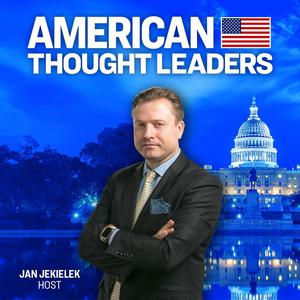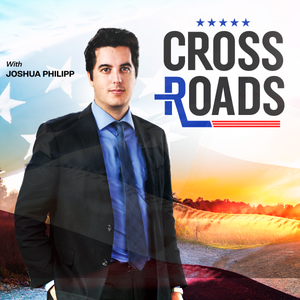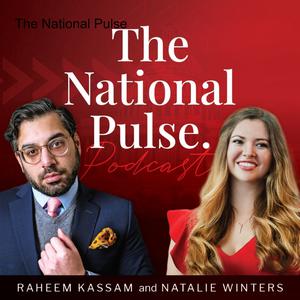
American Thought Leaders
Jan Jekielek
American Thought Leaders hosted by Jan Jekielek
- 1 hour 3 minutesAmerica Has Disease Care, Not Health Care: Dr. Jingduan Yang
“In America, we really don’t have a health care system, even though we call everything ‘health’ insurance, ‘health’ care, and this and that,” says Dr. Jingduan Yang.
“We’re not healthy as a nation because we allocate all resources trying to deal with consequences of problems or disease, rather than to prevent [them] and find the root causes that cause those problems,” he says.
Yang is a specialist in psychiatry and integrative medicine, and is a fifth-generation practitioner of traditional Chinese medicine. He’s the CEO of Northern Medical Center and founder of the Yang Institute of Integrative Medicine.
Western medicine could learn a lot from the approach of Chinese medicine, he says, which emphasizes prevention before problems become structurally damaging and looking at every part of the body as part of an integrated system.
“In Chinese medicine, every organ is connected. ... Therefore, there’s no way you could address any part of the body’s issue without looking at the whole system,” Yang says.
Views expressed in this video are opinions of the host and the guest, and do not necessarily reflect the views of The Epoch Times.
22 January 2025, 2:45 am - 47 minutes 16 secondsWhy Europe Is Putting the Brakes on Gender Interventions: Leor Sapir
“The UK has now banned puberty blockers—probably will ban cross-sex hormones too, is my prediction, in the next few years,” said Leor Sapir, a fellow at the Manhattan Institute.
He has been following the massive increase in children identifying as transgender and undergoing what’s known as “gender-affirming care” treatment—from puberty blockers to double mastectomies.
“[The World Professional Association for Transgender Health] commissioned systematic evidence reviews as part of the process of developing [Standards of Care Version 8]. When it found out that the evidence reviews, specifically for minors, were unimpressive and did not get them the results that they wanted—that would support their medical approach, they suppressed them. They basically instructed the researchers at Johns Hopkins University who were doing these systematic reviews to not publish them,” said Sapir. “Any way you look at it, WPATH greatly deviated from how responsible, trustworthy medical guidelines are supposed to be developed.”
His current area of focus is the pushback to gender interventions for minors, including state bans, lawsuits, and a landmark case now at the Supreme Court.
“This case has tremendous consequences for what’s going to happen in the 26 states that have banned these interventions in minors,” said Sapir.
Views expressed in this video are opinions of the host and the guest, and do not necessarily reflect the views of The Epoch Times.
19 January 2025, 2:30 am - 36 minutes 56 secondsBribery, Lawfare, and Media Smears: The CCP’s Campaign to Destroy a Religious Group in America—Erping Zhang
The Chinese Communist Party (CCP) is stepping up its efforts to destroy a religious group in America that it sees as a threat to its rule, according to leaked information from multiple CCP insiders.
Tactics include lawfare, bomb threats, smear campaigns, impersonation attempts, and bribing U.S. officials. The Department of Justice sentenced a Chinese agent for trying to bribe an IRS agent to target practitioners of the Falun Gong spiritual discipline.
So what’s going on exactly? And why would this be a priority for the Chinese regime?
Today, I’m sitting down with Erping Zhang, president of the International Falun Dafa Association.
Views expressed in this video are opinions of the host and the guest, and do not necessarily reflect the views of The Epoch Times.
17 January 2025, 10:27 pm - 1 hour 7 minutesWhy Trump May Be the First Post-Racial President: Bob Woodson and Joshua Mitchell
“I think race is a very emotional issue with black America, and it can be very easily manipulated. And it has been manipulated for decades by people who use it to direct blacks to vote in a certain way.”
In this latest episode in our special series on the U.S. presidential transition, I sit down with Bob Woodson and Joshua Mitchell. Woodson is a civil rights activist and the Founder and President of the Woodson Center. Mitchell is a professor of political theory at Georgetown University.
“The partisan debate on race is driven by guilty whites who are seeking absolution from crimes they never committed, and entitled blacks who are seeking absolution from injustices they never suffered,” says Woodson.
What does Trump’s victory mean for black America? Will Trump be the first post-racial president? And what is the role of mediating institutions and what Woodson and Mitchell call “invisible knowledge” in revitalizing American communities?
“We have levels of despair and depression because the state has become this administrative behemoth, making citizen competence impossible,” says Mitchell. “We’ve got this invitation, literally, to return to the founders’ vision, where we have citizen competence. The only way you can have small government is if you have massive citizen competence.”
“The biggest challenge we’re facing is a moral and spiritual free-fall that is consuming people of all races and all colors,” says Woodson. “But we’re not going to be able to find the source of this solution if we are separated by race, and that’s why we must become post-racial.”
Views expressed in this video are opinions of the host and the guest, and do not necessarily reflect the views of The Epoch Times.
15 January 2025, 5:35 pm - 31 minutes 28 secondsAmericans Are Not Eating ‘Real Food’—Here’s What You Need to Know: Vani Hari
Sponsor special: Up to $2,500 of FREE silver AND a FREE safe on qualifying orders - Call 855-862-3377 or text “AMERICAN” to 6-5-5-3-2
“Our bodies are not meant to handle these man-made chemicals that have been invented in the last 50 years. These chemicals are invented for one sole purpose, and that’s to improve the bottom line of the food industry, not improve our health.”
In this episode, I sit down with author and activist Vani Hari, popularly known as the “food babe.” For over a decade, she has been exposing toxic ingredients in America’s food—and getting companies to stop using them.
“[The FDA has] not reviewed the safety data of these artificial dyes in over 10 years. However, children’s consumption of these artificial food dyes have increased 500 percent,” says Hari. “We’re not trying to stop fast food or get rid of fast food. We want to make it the same as they do in Europe. McDonald’s french fries: 11 ingredients here in the United States, including dimethyl polysiloxane, an ingredient you would find in silly putty ... but in the UK, there’s three ingredients, and the fourth ingredient is optional. It’s just salt.”
Hari argues that food companies should add a warning label to every product that uses artificial food dyes, as they already do in Europe.
“That would automatically almost force the food industry to remove them here as well, because they do not want parents to be concerned about their products,” she says.
Views expressed in this video are opinions of the host and the guest, and do not necessarily reflect the views of The Epoch Times.
13 January 2025, 12:30 pm - 1 hour 15 minutesTrump’s Tariffs on China: Will They Work? Nazak Nikakhtar Explains
In this latest installment of our special series on the U.S. presidential transition period, I’m sitting down with Nazak Nikakhtar, former assistant secretary of commerce for industry and analysis under the first Trump administration. She’s an expert on trade and national security and a partner at Wiley Rein LLP.
In this episode, we dive into the debate surrounding the use of tariffs. How have China’s unfair trade practices destroyed American manufacturing? Will tariffs work? Or will they make things worse for the average American? And what other tools will Trump have at his disposal that can restore and protect U.S. industry?
Views expressed in this video are opinions of the host and the guest, and do not necessarily reflect the views of The Epoch Times.
10 January 2025, 2:27 pm - 26 minutes 26 secondsHere’s Why Americans Are Becoming Sicker: Calley Means
Sponsor special: Up to $2,500 of FREE silver AND a FREE safe on qualifying orders - Call 855-862-3377 or text “AMERICAN” to 6-5-5-3-2
“We’re being lied to about chronic disease. That’s 90 percent of medical spending—92 percent of American deaths are chronic disease. Only 8 percent are infectious. And we have this system that profits from that. But what we could do, which is what President Trump and Bobby Kennedy talked about, is get to the root cause.”
In this episode, I sit down with Calley Means, co-author of “Good Energy: The Surprising Connection Between Metabolism and Limitless Health.”
He has been working in the Make America Healthy Again (MAHA) movement on a blueprint for reforming the public health establishment.
“We’re going to let information out. We’re going to do new research on why we’re getting sick. We’re also going to release the existing research. We’re going to stop infantilizing the American patient. We’re going to trust Americans that they’re trying to make the best decisions for their health and their kids,” says Means.
“I really think that the problem with public health in America right now is we’ve relied too much on the experts. We should have expertise, we should have to read science, but we should have it open, and then really unlock flexibility for Americans to make the best decision for their personal situation with their doctors.”
Views expressed in this video are opinions of the host and the guest, and do not necessarily reflect the views of The Epoch Times.
9 January 2025, 3:13 am - 1 hour 1 minuteWhy the World Has Less Trust in the Dollar, and How Trump Can Change That: Carol Roth
Sponsor special: Up to $2,500 of FREE silver AND a FREE safe on qualifying orders - Call 855-862-3377 or text “AMERICAN” to 6-5-5-3-2
“We do need to shrink our spending and we need to get a hold on the debt, but it needs to be done in a way that you have the growth go first. Otherwise, you’re going to end up with less revenue, which means you’re going to actually widen the deficit and create a worse problem—a ‘no good deed goes unpunished’ type of scenario.”
As part of our special series on the U.S. presidential transition period, I’m sitting down with Carol Roth, a former investment banker and author of several books—most recently, “You Will Own Nothing: Your War with a New Financial World Order and How to Fight Back.”
In this episode, we discuss the biggest financial challenges facing the incoming administration and how best to navigate them.
Views expressed in this video are opinions of the host and the guest, and do not necessarily reflect the views of The Epoch Times.
3 January 2025, 9:17 pm - 52 minutes 42 secondsHow DEI and Gender Ideology in Medicine Is Harming Patients: Dr. Stanley Goldfarb
More than 5,000 minors in the United States underwent transgender surgeries between 2019 and 2023 and nearly 14,000 had transgender-related treatments, according to research into insurance billing codes conducted by the advocacy organization Do No Harm. In total, these treatments and procedures cost at least $119 million.
Dr. Stanley Goldfarb is a board-certified kidney specialist and the board chairman of Do No Harm, which recently released a national database on transgender-related services at medical facilities across America.
The “gender-affirming” treatment model is based on flimsy evidence and has, in many cases, robbed children of normal lives, he says.
Dr. Goldfarb says social justice ideology and diversity, equity, and inclusion standards have taken over medical education, to the detriment of patients. Students are no longer taught to think critically and to properly evaluate medical research and statistics for weaknesses and flaws, he says.
Views expressed in this video are opinions of the host and the guest and do not necessarily reflect the views of The Epoch Times.
1 January 2025, 9:13 pm - 28 minutes 31 secondsLt. Gen. Michael Flynn: Putting ‘Country Before Self’ Is Necessary to Repair America
Retired Lt. Gen. Michael Flynn has been advising President-elect Donald Trump’s national security team. At Turning Point USA’s AmFest conference in Phoenix, I sat down with him to discuss key challenges facing the incoming administration, such as how to address Chinese Communist Party (CCP) control of the Panama Canal.
“Who’s controlling this very important waterway? It’s the most strategic waterway for the United States of America on the planet,” Flynn says. “China is the dominant player right now between us and them.”
Lt. Gen. Flynn says the Chinese regime either owns or controls some component of 80 percent of the largest ports of our hemisphere. “And yet we have people in our government that go ‘Russia, Russia, Russia.’”
He argues that although America has always been a benevolent “nation of givers,” it must focus more energy on domestic policy, and that every citizen has a responsibility to engage in local action.
Views expressed in this video are opinions of the host and the guest, and do not necessarily reflect the views of The Epoch Times.
30 December 2024, 7:49 pm - 49 minutes 26 secondsThe Future of TikTok and the Collapsing Chinese Economy: Kyle Bass
Sponsor special: Up to $2,500 of FREE silver AND a FREE safe on qualifying orders - Call 855-862-3377 or text “AMERICAN” to 6-5-5-3-2
Kyle Bass is the founder and chief investment officer of Hayman Capital Management, and he’s known for his prescient bets on major global economic events.
In this episode, we dive into why he believes China’s economy is collapsing, why Bytedance hasn’t sold TikTok despite a looming January deadline, and what he believes the big economic and financial priorities of the incoming Trump administration should be.
Views expressed in this video are opinions of the host and the guest, and do not necessarily reflect the views of The Epoch Times.
27 December 2024, 4:59 am - More Episodes? Get the App
Your feedback is valuable to us. Should you encounter any bugs, glitches, lack of functionality or other problems, please email us on [email protected] or join Moon.FM Telegram Group where you can talk directly to the dev team who are happy to answer any queries.
 The Devin Nunes Podcast
The Devin Nunes Podcast
 The Sharyl Attkisson Podcast
The Sharyl Attkisson Podcast
 CrossroadsET
CrossroadsET
 Bannon`s War Room
Bannon`s War Room
 John Solomon Reports
John Solomon Reports
 The National Pulse
The National Pulse